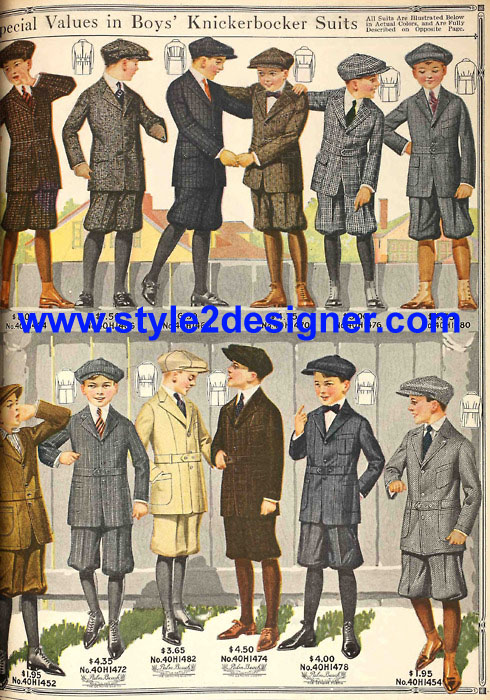Knickerbockers are men's breeches or baggy-kneed trousers especially well-liked in the early twentieth century USA. Golfer's plus twos and plus fours wear breeches of this type. Before World War II, skiers frequently wore knickerbockers also typically ankle-length.
Until after World War I, in several Anglophone countries, boys habitually wore short pants in summer and knickerbockers or "knickers" or "knee pants" in winter season. At the beginning of teenage years, they graduated to long trousers. In that era, the changeover to "long pants" was a major practice of passage.
For example, the classic song Blues in the Night by Johnny Mercer: "My mammy done told me, when I was in knee-pants, my mammy done told me, son...”
Baseball players are dressed in a stylized form of knickerbockers, even though the pants have become less baggy in modern decades and some contemporary ballplayers opt to pull the trousers seal to the ankles. The white trousers worn by American football officials are knickerbockers, and while they have become less baggy, they are still worn ending shortly below the knee. In topical years, the NFL has equipped its official with long trousers rather than knickers in cold weather conditions.
Knickerbockers have been well-accepted in additional sporting endeavors, particularly golf, rock climbing, cross-country skiing and bicycling.
Certainly in cycling, they were standard clothing for almost hundred years, with the majority of archival photos of cyclists in the period before World War I showing men wearing knickerbockers tucked into long socks. They stay behind fairly popular in Britain where they were called "breeks" or "trews" in the years between World War I and World War II, but ultimately were concealed in attractiveness by racing tights, even between the enormous majorities of cyclists who never raced.
Invariably referred to as "knickers" in the US, where the British definition of that term is unidentified, they lived on as a just-past-the-knee modification of racing tights reserved for colder-weather riding.
During the period of beginning of the year 1980s, media attention in the then-Lady Diana Spencer brought a epigrammatic commercial renewal of the look in women's and unisex fashion both in the places Europe and North America which were predominantly along with the "town and country", "New Romantic" and "preppie" sets. However, by 1984 the style had diminished as more top-heavy styles with snug pants rendered the style obsolete.
Until after World War I, in several Anglophone countries, boys habitually wore short pants in summer and knickerbockers or "knickers" or "knee pants" in winter season. At the beginning of teenage years, they graduated to long trousers. In that era, the changeover to "long pants" was a major practice of passage.

For example, the classic song Blues in the Night by Johnny Mercer: "My mammy done told me, when I was in knee-pants, my mammy done told me, son...”
Baseball players are dressed in a stylized form of knickerbockers, even though the pants have become less baggy in modern decades and some contemporary ballplayers opt to pull the trousers seal to the ankles. The white trousers worn by American football officials are knickerbockers, and while they have become less baggy, they are still worn ending shortly below the knee. In topical years, the NFL has equipped its official with long trousers rather than knickers in cold weather conditions.
Utilize in sports accomplishments
Knickerbockers have been well-accepted in additional sporting endeavors, particularly golf, rock climbing, cross-country skiing and bicycling.
Certainly in cycling, they were standard clothing for almost hundred years, with the majority of archival photos of cyclists in the period before World War I showing men wearing knickerbockers tucked into long socks. They stay behind fairly popular in Britain where they were called "breeks" or "trews" in the years between World War I and World War II, but ultimately were concealed in attractiveness by racing tights, even between the enormous majorities of cyclists who never raced.
Invariably referred to as "knickers" in the US, where the British definition of that term is unidentified, they lived on as a just-past-the-knee modification of racing tights reserved for colder-weather riding.
During the period of beginning of the year 1980s, media attention in the then-Lady Diana Spencer brought a epigrammatic commercial renewal of the look in women's and unisex fashion both in the places Europe and North America which were predominantly along with the "town and country", "New Romantic" and "preppie" sets. However, by 1984 the style had diminished as more top-heavy styles with snug pants rendered the style obsolete.
Comments
Post a Comment